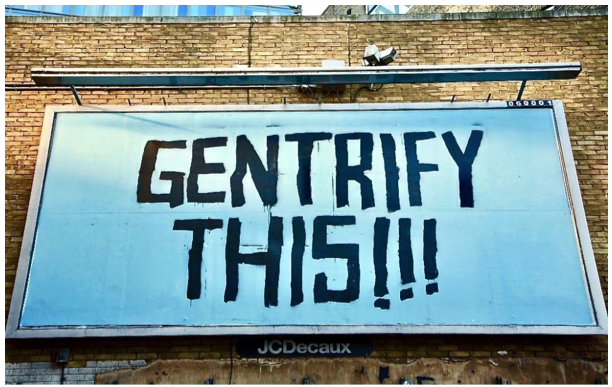CommentsMCDONALD REPORT-From neighborhood activists to city planners, everyone knows that Los Angeles Mayor Eric Garcetti and the City Council love transit-oriented development. What many people don’t know, and what LA politicians would rather not discuss, is that it’s fueling gentrification in the nation’s second largest city.
UCLA researchers dropped that fact bomb about transit-oriented development in LA last August.
Teaming up with the Urban Displacement Project at UC-Berkeley, they released a study with several alarming findings. In their own words, they wrote:
- Areas around transit stations are changing and many of the changes are in the direction of neighborhood upscaling and gentrification;
- Examining changes relative to areas not near light-rail or subway projects from 2000 to 2013, neighborhoods near those forms of transit are more associated with increases in white, college-educated, higher-income households and greater increases in the cost of rents. Conversely, neighborhoods near rail development are associated with greater losses in disadvantaged populations, including individuals with less than a high school diploma and lower-income households (read that again… it’s the very definition of gentrification);
- The impacts vary across locations, but the biggest impacts seem to be around the downtown areas where transit-oriented developments interact with other interventions aiming to physically revitalize those neighborhoods.
UCLA provides a map and data to back up those hard facts. If Garcetti and the City Council haven’t done so already, they should take a long, hard look.
In fact, Paul Ong, director of UCLA Luskin’s Center for Neighborhood Knowledge, says California politicians should use the report to ensure that “progress” through development is “fair and just.”
Unfortunately, LA elected officials hate public dialogues about the Big Picture definitions of “progress,” and they spend little time considering what’s “fair and just” development for the masses.
Instead, Mayor Eric Garcetti and the City Council talk about creating a more “environmentally sustainable” city by cutting down on car usage. Hence, the need for more apartment complexes and mixed-use buildings near bus or rail stops — known as transit-oriented development.
Developers and politicians, though, regularly greenwash controversial developments for political cover. What’s worse, serious plans for a more “economically sustainable” city for the working- and middle-class — teachers, garment workers, senior citizens, struggling artists, among others — are nearly non-existent at LA City Hall.
Unsurprisingly, UCLA and UC-Berkeley researchers also found that “Bay Area municipalities have in their books many more anti-displacement policies than municipalities in LA County.” In the city of Los Angeles, Garcetti and the City Council have implemented few substantive and specific anti-displacement policies.
It’s one big reason why, as the Los Angeles Times reported last year, more than 22,000 rent-controlled apartments have been taken off the market since 2001. An LA Times graph shows that disturbing trend dramatically up-ticked during Garcetti’s time as mayor.
All in all, as stewards of the nation’s second largest city, LA politicians have shown that they are not interested in addressing the impacts of gentrification-inducing transit-oriented development. So what are they interested in?
Maintaining power. Or, put another way, keeping their jobs and possibly landing better ones. Politicians do that by raising lots of money, which helps them fend off challengers on Election Day. Enter the deep-pocketed developer.
For years, developers have been key benefactors for LA politicians. They contribute enormous sums of campaign cash and other political money — such as giving to a politician’s favorite cause or “officeholder” account, a kind of slush fund that elected officials use for dining and travel expenses.
Garcetti, in fact, established a non-profit called the Mayor’s Fund for Los Angeles. It has attracted big bucks from developers and various companies — in its first year, Garcetti collected a whopping $14.6 million.
The Coalition to Preserve LA, which sponsored the development reform initiative known as Measure S, found that developers and other bigwigs in the real estate industry (also known as LA’s “real estate industrial complex”) forked over at least $6 million in campaign contributions to city politicians since 2000.
That’s a conservative number. It’s probably much higher.
In the past year, for example, the LA Times reported that billionaire developer Rick Caruso shelled out hundreds of thousands to L.A. politicians and their causes while seeking City Hall approvals for a luxury housing tower for the super wealthy. One beneficiary was Garcetti’s non-profit, which accepted $125,000 from Caruso.
The billionaire developer, by the way, greenwashed the controversial mega-project, a gigantic high-rise plopped down at a gridlocked intersection. To the aggravation of neighborhood activists, Caruso promoted it as a transit-oriented development.
The LA Times also uncovered the shocking “Sea Breeze Scandal.” Perhaps illegally, developer Samuel Leung, who also needed City Hall to green light a luxury housing mega-project, funneled more than $600,000 to Mayor Eric Garcetti and other LA politicians.
In the end, Caruso and Leung got what they wanted.
As one can see, political money is also part of the gentrification equation. Developers shell out beaucoup bucks to L.A. politicians, and Garcetti and the City Council return the favor by approving transit-oriented and luxury developments. Developers then make tens of millions in profits, politicians have fatter campaign chests, and residents get hit by a wave of gentrification.
Adding insult to injury, Mayor Eric Garcetti and the City Council are selling out the working- and middle-class for what amounts to chump change. One’s life, home, and family are worth much more than $125,000.
(Patrick Range McDonald, an award-winning journalist, was senior researcher and website editor for the Coalition to Preserve LA.) Prepped for CityWatch by Linda Abrams.
Explore
Our mission is to promote and facilitate civic engagement and neighborhood empowerment, and to hold area government and its politicians accountable.

 CityWatch Los Angeles
Politics. Perspective. Participation.
CityWatch Los Angeles
Politics. Perspective. Participation.
07
Sun, Dec














